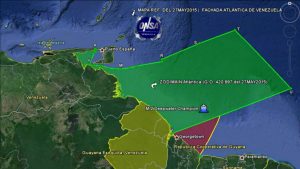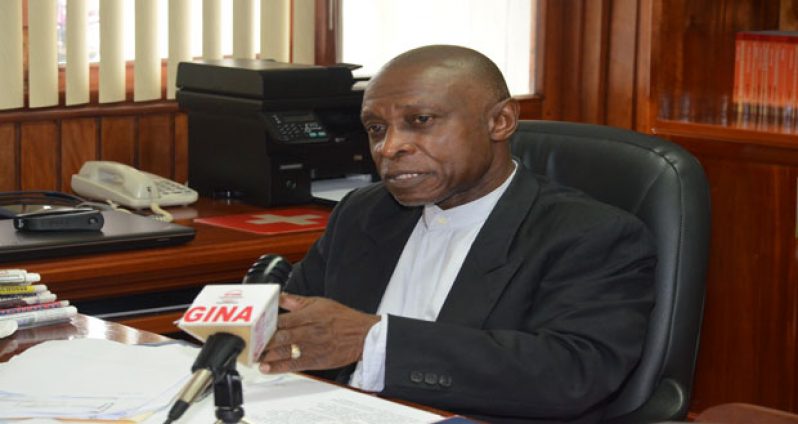IN face of a May 27 Executive Decree by Venezuela’s President Nicolas Maduro — which not only reaffirms that country’s claim to the Essequibo, but also makes new claims regarding maritime boundaries across Guyana’s coastline — Guyana’s Vice-President and Foreign Affairs Minister, Carl Greenidge is calling on the Venezuelan Government to provide evidence to the international bodies in support of its claim.The controversy over Guyana’s Essequibo region dates back to 1962 when Venezuela sought to reopen an 1899 arbitral award which outlined the Guyana/Venezuela border.
Minister Greenidge recalled historical accounts of 1895, when a judge each was chosen from the United States, the United Kingdom and Russia to deliberate on the Guyana/Venezuela border. When the tribunal of judges was formed, Guyana was formally the colony of British Guiana, and Britain’s interests were represented by the Judge from the United Kingdom.
Minister Greenidge, in an interview Friday with this publication at his Shiv Chanderpal Drive office, said the interests of Venezuela in the 1899 arbitration were represented by the judge from the United States, with the Russian judge being the third element of balance in the tribunal.
“That [body of Judges] was not set up for Guyana’s benefit because, in the end, the arbitral award granted to Venezuela at the mouth of the Orinoco River and the banks on the side of the Orinoco,” Greenidge stated, while declaring, “Guyana lost territory as a result of that award.”
The current boundary between Guyana and Venezuela was demarcated in a joint effort by Guyana and Venezuela, with the assistance of Brazil from 1899 to 1905.
Asked whether Brazil has made any statement as the border controversy continues to unfold, the Foreign Minister responded that while he cannot speak wholly on behalf of Brazil, the current situation affects the interests of Brazil in Guyana’s Essequibo region, and he would not expect the Brazilians to stay silent all the while.
VENEZUELA’S NEW CLAIMS
Minister Greenidge also disclosed that the presidential decree made in Venezuela has made new claims for maritime boundaries, which include the waters off the coast of Demerara. This move by Venezuela seeks to create an Atlantic Coast for that country, thus making Guyana a landlocked country with no access to the open Atlantic Ocean.
The Venezuelan Government went as far as to accuse the Guyana Government of granting exploratory concessions to US oil giant, Exxon Mobil without Venezuela’s consent, an assertion which the Foreign Minister rejected, since “you would have had to have been the owner of Demerara to be able to lay claim to that.”
The Minister, responding to claims which he feels are unfounded, said: “As regards marine territory, there’s a process by which each country defines what it thinks it has, and it goes to an international body.”
He added that it is then the power of that international body to endorse or sanction those claims.
Greenidge said, however, that no such claims have been expressed to any international body. “In claiming this expanse, the Government of Venezuela has not demonstrated — and indeed cannot demonstrate — that the principle or the line they claim has any basis whatsoever in any known formula for allocation of the ocean,” Greenidge asserted.
TREATIES ARE SACROSANCT
The 1899 Arbitral Award was a treaty set up between the Governments of Venezuela and the United Kingdom. That treaty was challenged when British Guiana gained independence from the United Kingdom and was officially declared Guyana.
“The world has agreed that treaties are sacrosanct. You can’t have those treaties and reopen them, otherwise there is no virtue. It makes no sense for me to agree to a treaty that a man can open again next year,” Minister Greenidge declared.
“In the 50-odd years since Venezuela has been alleging that this treaty is null and void, they have never produced a single shred of evidence to the Geneva Board of Commonwealth to establish the validity of their claim,” he added.
The Minister noted that challenging the treaty is a juridical issue, and in the absence of any evidence to challenge the agreement, the treaty stands.

LAW OF THE SEA
As it relates to Guyana’s rights in its Atlantic waters, the Foreign Ministry is depending on Guyana being a party to the United Nations Convention on the Law of the Sea to ensure Guyana’s territorial rights.
Venezuela is, however, not a party to this convention. Asked whether Guyana is optimistic that Venezuela would accept any ruling made in regard to that convention, Minister Greenidge said, “If the world recognises that the apportionment of marine resources [and] resources off the continental shelves of the continents is important, and that is has to be done in an orderly manner, all countries will have to embrace that mechanism, otherwise there will be disorder.”
“That is why the countries that have signed to the Law of the Sea have signed. Those who have not signed have a reason, and the question is ‘What is the reason?’” he added.
“If order is the reason you set up the Law of the Sea, then those who have not signed are clearly not interested in order,” he posited.
VENEZUELA GIVES
The Minister said it has come to his attention — from a number of press releases coming from the Venezuelan Government — that the country provides resource assistance to the Caribbean, including Guyana. While he acknowledged this to be true, he said, “We find it rather intriguing that when the question of Venezuela’s action arises, Venezuela starts telling you about the favours they have done to the Caribbean.”
On that note, he questioned the meaning of such statements, while declaring, “Why stop at two-thirds of Guyana’s territory. You’ve done the Caribbean a favour; well, maybe we should give you a right to all our territory.”
Venezuela holds the PetroCaribe Agreement with the Caribbean countries excluding petroleum-rich Trinidad and Tobago. That agreement for subsidised fuel coming from Venezuela has existed since 2005, and has offered some much-needed economic assistance to cushion the Caribbean from the vagaries of global oil prices.
According to Greenidge, “Yes, Guyana benefited from PetroCaribe, but on the one hand, you are giving assistance from PetroCaribe, [and] on the other you are making pronouncements that discourage Guyana’s development and access to resources.”
AT HOME IN VENEZUELA
While the controversy blazes, theorists continue to throw their scholarship into the decades-long dilemma. One such theorist is respected diplomat, Sir Ronald Sanders. In a recent post on the Antillean Media Group (AMG), Sir Sanders opined that the answer to Venezuela’s recent claims over Guyana lies in the tense political situation in that country, where President Nicolas Maduro continues to face a stiff political opposition and dire economic circumstances, as commodities like toilet paper are now scarce.
A second theory put forward by Sanders is the contempt held by Venezuela for Exxon Mobil. When Venezuela nationalised its oil industry in 2007, under the late President Hugo Chavez, Exxon Mobil, which now operates in Guyana’s waters, demanded some US$16B for Venezuela’s termination of its contractual agreements with the oil giant.
Following a ruling in the International Court of Justice, Venezuela was ordered to pay some US$1.4B to Exxon Mobil. It is unclear whether the money has been paid off.
THE WAY FORWARD
Discussions have continued between the Guyanese and Venezuelan Governments. As recent as Friday, Foreign Minister Greenidge met with Venezuelan Ambassador to Guyana, Reina Margarita Arratia Diaz, in his Shiv Chanderpaul Drive office.
At the multilateral level, Guyana has received an invitation from the Union of South American Nations (UNASUR) to agree to a bilateral meeting with Venezuela. Minister Greenidge is, so far, of the view that all avenues have been exhausted, and is calling on the Office of the United Nations Secretary-General to intervene as a third party.
While the minister maintains that both Guyana and Venezuela are ensuring that discussions are happening at a higher level to “keep the situation under control,” he cautioned that keeping the situation “under control” is a loaded concept, since perception and deliberation are vital in the situation.
By Derwayne Wills




.png)









